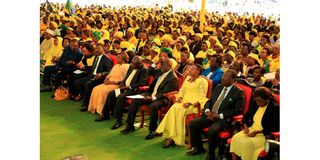Let President join the call for gender violence treaty

President William Ruto with other Kenya Kwanza leaders during the Kenya Kwanza women charter conference at Nyayo National Stadium on June 10, 2022. The President should take a leading role in the growing international movement which calls for a global treaty to curb SGBV.
What you need to know:
- The systems still place a heavy burden on SGBV survivors, who are forced to choose between risking their lives in seeking justice rather than emphasising the state’s responsibility to prevent it.
- If women truly matter to Kenya Kwanza, there could be no better signal than for the President to take a leading role in the growing international movement which calls for a global treaty to curb SGBV.
- Women cannot thrive in the new Kenya if they are not safe from violence.
William Ruto became President on September 13 after running on the ticket of the Kenya Kwanza coalition’s United Democratic Alliance Party (UDA), whose 68-page election campaign manifesto rightly includes a nine-point “women’s agenda”.
The bulk of these commitments is consistent with demands made by women’s rights activists that ended up in the Constitution.
It embraces, among other points, fully implementing the two-thirds gender rule within 12 months of assuming office; providing financial and capacity-building support for women through a “Hustler Fund” for woman-led co-operatives; increasing personnel at gender desks in police stations; addressing spousal consent in land sales; tackling low access to sanitary pads; and establishing a social welfare fund for Kenyan women working abroad as a safety net for distressed diaspora citizens.
Regrettably, the ideas may be unattainable without addressing violence against women and girls, which media reports show as normalised to the extent of being accepted.
There is little consequence for culprits while the responsibility rests with the victim, not the perpetrator, to prevent violence.
We do see incremental progress though. In July, the Director of Public Prosecutions, Noordin Haji, launched a reference guide for prosecutors dealing with sexual and gender-based violence (SGBV) cases.
While that is welcome, the systems still place a heavy burden on survivors, who are forced to choose between risking their lives in seeking justice rather than emphasising the state’s responsibility to prevent it.
In the third decade of the new millennium, in a country full of innovation, resilience and ‘hustle’, is this a legacy we would wish for?
If women truly matter to Kenya Kwanza, there could be no better signal than for the President to take a leading role in the growing international movement which calls for a global treaty to curb SGBV.
Drafted by a global coalition, it combines the best of public health and human rights practices.
Key interventions
Shaped after extensive global consultation with experts in human rights, science and international diplomacy, it features a metrics-based system of reporting based on five key interventions which work in concert to drastically lower rates of violence.
The “Whole-Hand Framework” is based on a whole-of-government and -society approach to ending SGBV and provides us with a practical approach to end this vicious cycle and build healthier, safer communities.
After all, women cannot thrive in the new Kenya if they are not safe from violence.
Our country no longer needs to bear the ignominy of one in three women and girls globally suffering SGBV.
A crisis this big requires a global commitment. President Ruto has the opportunity to play a leading role to change the lives of women and girls not just in Kenya but across the continent and the world.
Ms Ng’inja-Croft is a lawyer and human rights advocate. [email protected].





